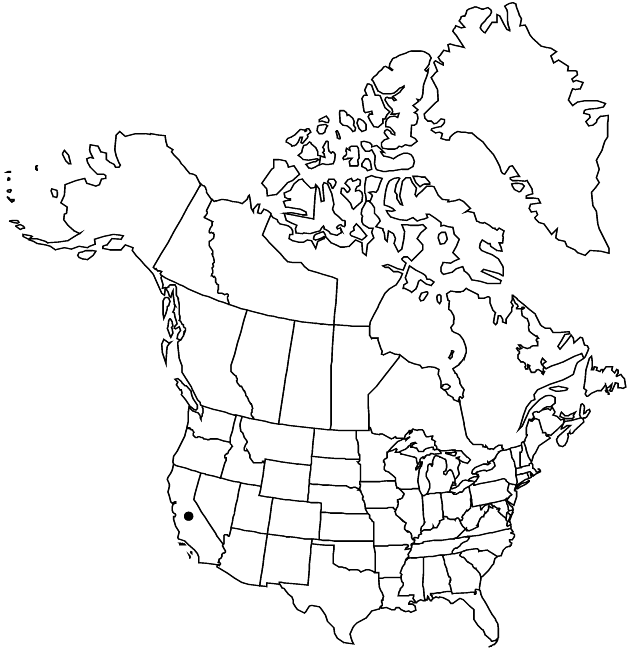Difference between revisions of "Chaenactis glabriuscula var. megacephala"
in War Department [U.S.], Pacif. Railr. Rep. 4(5): 104. 1857.
FNA>Volume Importer |
imported>Volume Importer |
||
| (6 intermediate revisions by 2 users not shown) | |||
| Line 1: | Line 1: | ||
{{Treatment/ID | {{Treatment/ID | ||
|accepted_name=Chaenactis glabriuscula var. megacephala | |accepted_name=Chaenactis glabriuscula var. megacephala | ||
| − | |accepted_authority=A. Gray | + | |accepted_authority=A. Gray |
|publications={{Treatment/Publication | |publications={{Treatment/Publication | ||
|title=in War Department [U.S.], Pacif. Railr. Rep. | |title=in War Department [U.S.], Pacif. Railr. Rep. | ||
| Line 8: | Line 8: | ||
}} | }} | ||
|common_names=Yellow pincushion | |common_names=Yellow pincushion | ||
| + | |special_status={{Treatment/ID/Special_status | ||
| + | |code=E | ||
| + | |label=Endemic | ||
| + | }} | ||
|basionyms= | |basionyms= | ||
|synonyms= | |synonyms= | ||
| Line 24: | Line 28: | ||
|elevation=300–1500 m | |elevation=300–1500 m | ||
|distribution=Calif. | |distribution=Calif. | ||
| − | |discussion=<p>Variety megacephala is known mainly from the southern Sierra Nevada foothills and adjacent San Joaquin Valley and Transverse Ranges; it intergrades extensively with vars. lanosa and glabriuscula. A specimen cited by P. Stockwell (1940) from Bingen, Klickitat County, Washington (Suksdorf, May 1907) was not checked; it is either misidentified or from an introduction that did not persist.</p> | + | |discussion=<p>Variety megacephala is known mainly from the southern Sierra <i>Nevada</i> foothills and adjacent San Joaquin Valley and Transverse Ranges; it intergrades extensively with vars. lanosa and glabriuscula. A specimen cited by P. Stockwell (1940) from Bingen, Klickitat County, Washington (Suksdorf, May 1907) was not checked; it is either misidentified or from an introduction that did not persist.</p> |
|tables= | |tables= | ||
|references= | |references= | ||
| Line 33: | Line 37: | ||
-->{{#Taxon: | -->{{#Taxon: | ||
name=Chaenactis glabriuscula var. megacephala | name=Chaenactis glabriuscula var. megacephala | ||
| − | + | |authority=A. Gray | |
| − | |authority=A. Gray | ||
|rank=variety | |rank=variety | ||
|parent rank=species | |parent rank=species | ||
| Line 47: | Line 50: | ||
|publication title=in War Department [U.S.], Pacif. Railr. Rep. | |publication title=in War Department [U.S.], Pacif. Railr. Rep. | ||
|publication year=1857 | |publication year=1857 | ||
| − | |special status= | + | |special status=Endemic |
| − | |source xml=https:// | + | |source xml=https://bitbucket.org/aafc-mbb/fna-data-curation/src/2e0870ddd59836b60bcf96646a41e87ea5a5943a/coarse_grained_fna_xml/V19-20-21/V21_1033.xml |
|tribe=Asteraceae tribe Heliantheae | |tribe=Asteraceae tribe Heliantheae | ||
|subtribe=Asteraceae (tribe Heliantheae) subtribe Chaenactidinae | |subtribe=Asteraceae (tribe Heliantheae) subtribe Chaenactidinae | ||
Latest revision as of 20:07, 5 November 2020
Plants 15–40 cm; proximal indument grayish, arachnoid, early glabrescent. Stems mostly 1–5, ascending to erect; branches mainly proximal. Leaves basal (withering) and cauline, 1–8 cm; largest blades ± plane, scarcely succulent, usually 1-pinnately lobed; lobes 2–7 pairs, ± remote, ± plane or terete. Heads mostly 1–3 per stem. Peduncles 5–20 cm. Involucres ± hemispheric to broadly cylindric. Phyllaries: longest 7–9 × 2–3 mm; outer glabrescent in fruit. Florets: inner corollas 5–8 mm. Cypselae 5–8.5 mm; pappi of 4(–5) scales in 1 series, longest scales mostly 5–8 mm, lengths ± 0.9(–1) times corollas.
Phenology: Flowering Mar–Jun.
Habitat: Dry, often sandy slopes, openings in chaparral, woodlands
Elevation: 300–1500 m
Discussion
Variety megacephala is known mainly from the southern Sierra Nevada foothills and adjacent San Joaquin Valley and Transverse Ranges; it intergrades extensively with vars. lanosa and glabriuscula. A specimen cited by P. Stockwell (1940) from Bingen, Klickitat County, Washington (Suksdorf, May 1907) was not checked; it is either misidentified or from an introduction that did not persist.
Selected References
None.
